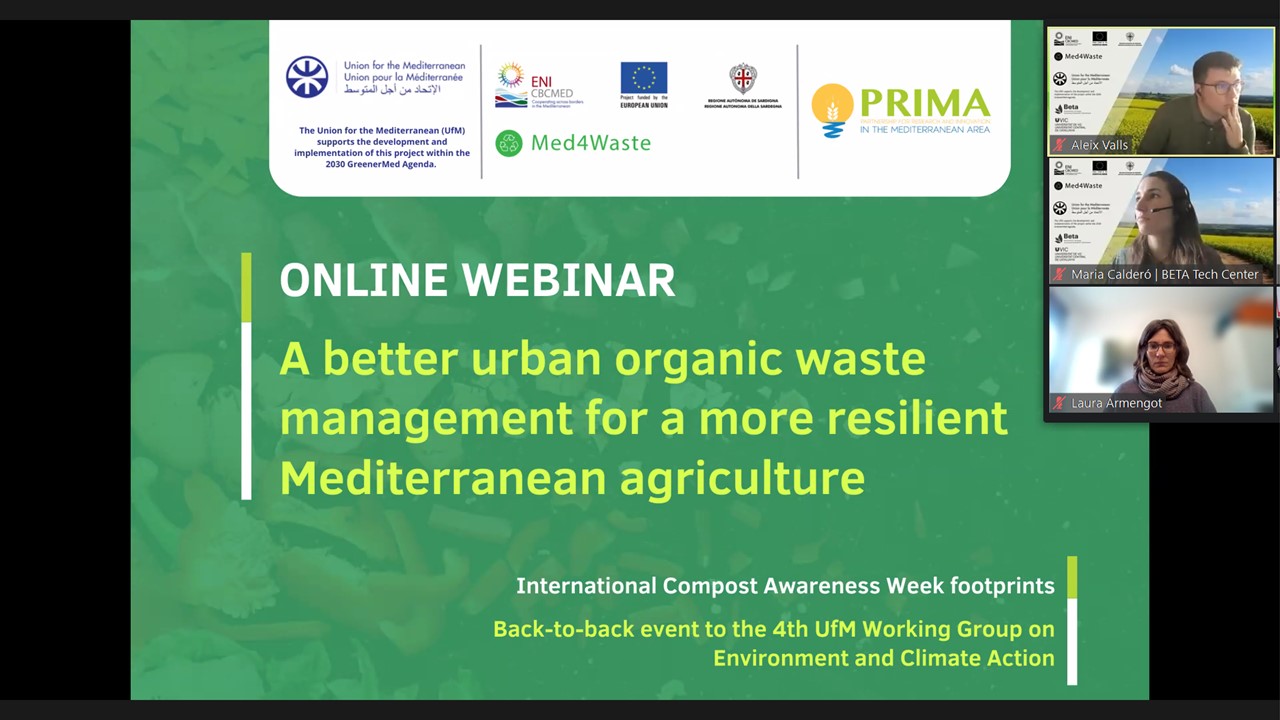Med4Waste Webinar on Organic Waste Management and Agricultural Resilience in the Mediterranean
The event was supported by the ENI CBC MED Programme, PRIMA and the Union for the Mediterranean.

The Med4Waste project organised a webinar on Wednesday 23 May that brought together a hundred experts and practitioners from different fields from across the Mediterranean region and beyond, to address the challenges and shared solutions between urban organic waste management and the need to move towards more resilient agricultural systems in the Mediterranean region.
The event was supported by the ENI CBC MED Programme, PRIMA and the Union for the Mediterranean itself, which supports the implementation of the project through the UfM 2030 GreenerMed Agenda.
The day was opened by Almotaz Abadi, Deputy Secretary General of the Union for the Mediterranean, Antonella Giglio, Director General of ENI CBC Med, and Octavi Quintana, Director of the PRIMA Foundation. The first turn was for Laura Armengot, researcher at the Soil and Nutrient Management Unit of BETA TC, who emphasised the role of fertilisers and organic amendments produced from urban organic waste to favour the productivity of agricultural soils and as a way of connecting the needs and challenges of both urban and rural areas.
Next, Joumana Sweiss, Project Officer at ENI CBC MED, Branch Office for Western Mediterranean spoke about the waste projects funded by the programme as well as future funding opportunities. Ali Rhouma, Project officer at PRIMA, presented the PRIMA projects in relation to the theme of the webinar and finally, Doha Zamel, UfM consultant, introduced the Water-Energy-Food-Ecosystems (WEFE) nexus within the UfM Water Agenda.
The day was also an excellent opportunity to present some of the actions being carried out by Med4Waste itself by the different project partners – CT BETA (UVIC-UCC), AUB, MedCities and BusinessMed. The focus of the capitalisation project was presented through the development of a catalogue of practices suitable for replication in other territories or a MOOC on waste management, as well as the free advice programme that is already providing resources to six cities and towns in the southern Mediterranean to improve their waste management plans. The results of the Business Report in the field of waste management in the Mediterranean and the opportunities that arise were also presented.
Part of the session focused on the global challenges of the Mediterranean region in the field of waste management and circular economy, giving way to representatives of the DECOST and CLIMA projects of the ENI CBC MED programme who presented experiences related to the application of various variants of composting as a system of urban waste management adapted to the reality of Mediterranean villages.
There were also representatives of the SUSTAINOLIVE and ISFERALDA projects of the PRIMA programme, which are working on the sustainability of agricultural systems characteristic of the Mediterranean region from various points of view. In addition, there was a networking session, moderated by the PRIMA project officers, where different participants were able to contribute by explaining the challenges of their projects and how to solve them.
Finally, Haris Paliogiannis, Project manager at MIO-ECSDE and Alessandra Sensi, Environment, Green and Blue Economy is well suited to promote sustainable management of waste resources in the Mediterranean region, given its social, economic and political heterogeneity. Waste management in many Mediterranean countries (especially MENA) faces multiple challenges that require strategic solutions and collaboration between institutions. In addition, up-to-date and coherent institutional frameworks in each country can play a key role in the development of action plans and infrastructures to support waste management.
Communities can also play an important role and take action to reduce their waste and implement sustainable practices. Also highlighted was the work of capitalisation projects such as Med4Waste which facilitates collaboration between projects and stakeholders to share knowledge, good practices and experiences in the field from across the Mediterranean region, as was the case in this webinar with participants from ENI CBC MED and PRIMA programmes, the UfM and a wide range of stakeholders.
The webinar also featured an interactive session hosted by EDAMA where participants were able to test their knowledge on waste management and resilient agriculture. The attendees were also very active sharing their ideas and visions through the webinar chat and interested in replicating the good practices in their territories as well as participating in the future actions of the project.
